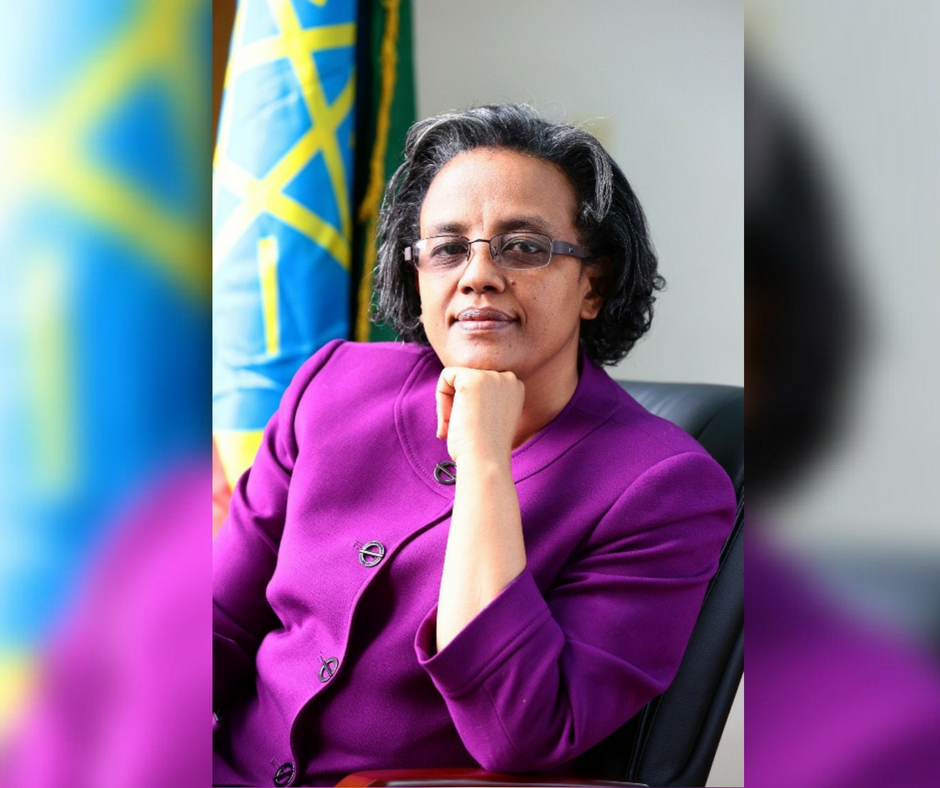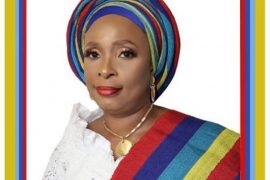Ethiopian women have proven to have potentials in leadership and economic activities but to what extent they are allowed to contribute to the growth of the economy is still food for thought.
In an exclusive interview with Amazons Watch Magazine, the First Lady of Ethiopia, Her Excellency Roman Tesfaye Abneh speaks on her vision for the average Ethiopian woman as well as her passion to eradicate deaths caused by cancer among women. Excerpt:
In few sentences, please describe the person of H.E ROMAN TESFAYE.
Roman Tesfaye is a mother of three grown up children and a career woman devoted to contributing her share towards making a positive difference to the betterment of her community, country and the world. Being the First Lady of the Federal Democratic Republic of Ethiopia since 2014 Roman Tesfaye is dedicated to leveraging her position to advocate for the wellbeing of Women and Children in Ethiopia.
Did you have any fears, growing up as a young girl? And did those fears affect your drive to become what you set out to be?
I grew up in a mainly rural surrounding where society was convinced the best thing in life for a young girl was to get married to a respectable man. Though my parents were committed to my education and thus refused many early marriage proposals the social pressure was not easy on them and me. In my society, there weren’t many opportunities for a woman to grow in a professional path. Thus my fear was if I did not do well at the national school leaving certificate examination which was highly competitive due to the limited space in higher education institutions; I would be forced to marry and remain in my village. That would have been the end of my professional ambitions. This fear made me determined to work hard and succeed in my education. I believe, throughout my life, I am blessed with the opportunity of doing what I am set out to be and will continue to do so for the years to come.
You seem to have been particularly drawn to cancer awareness programs since your assumption of office. What specific aspects of the cause are your areas of interest?
Cancer is a terrible disease which causes disastrous social and economic burden. In Ethiopia and many other African countries being diagnosed with cancer is perceived as equivalent to a death sentence. This is because there are very few cancer treatments and care institutions. Treatment drugs are unaffordable to the significant majority of Africans. In Ethiopia for example; there is only one comprehensive cancer treatment hospital despite 66,000 documented new cancer cases every year. This mismatch between the demand and supply as well as late diagnosis caused by the lack of awareness about the disease diminishes the chance of survival of cancer patients. Looking at the figures cervical and breast cancer are among the leading causes of cancer deaths in Africa. That means women are the primary victims of the disease. Because of the age-old attitude towards the woman and their unequal social and economic status they are unlikely to receive timely medical attention. This is causing lots of preventable deaths of mothers due to cancer. That is why I took the initiative to advocate for cancer prevention and control in order to draw more policy attention and investment to the expansion of cancer treatment and care facilities. My advocacy work also aims at increasing public awareness so that people know about the disease and adapt to a healthier lifestyle that can help to reduce the risk of cancer.
Having served in the Ethiopian government and specifically in the Ministry of Gender, what would you say are some of the most pressing challenges faced by women in the Ethiopian workforce?
I would like to adopt a broader definition to the term “workforce” because if we are referring to the paid labour only the definition excludes the role of the majority of Ethiopian women in the development of our society. The women staying at home and giving their best to raise their children and to sustain a family are pillars of a functioning society. They should be recognized as part of the workforce even though their contribution is not rewarded financially. For this part of the workforce, the most pressing challenges start from the attitude of society and more importantly that of policy and programme-makers that excludes their participation and their interests from policy-making and investment priorities. These women should be given the opportunity to articulate their needs in development planning. Their ongoing contribution, as well as untapped potentials for the progress of society, needs to be utilized. Through various women empowerment measures, we need to provide the means so that they are equipped with the skills and resources they need to improve their livelihoods and to become equal beneficiaries of the development process. Only when we do that are we able to ensure a transformation and sustainable development of a society. And only when we are able to do that are we most likely to see an equal share of women professionals in the paid workforce particularly at leadership positions. Referring to the paid or formal workforce, the challenges start from the disproportionate representation of women in this category of the workforce. The majority of women are in a low paying and subordinate position of the job market. This, of course, arises from the unequal access to education Ethiopian women had for generations as well as the traditional role assigned to them which places many hurdles in their quest for chasing a professional path. Things may look very different today and obviously there are many improvements regarding women’s’ rights and their access to opportunities. But we are far from achieving a society that gives women the same opportunities to succeed professionally and a system that ensures the equitable distribution of benefits between men and women. This is way in my role as a First Lady, women empowerment is something very close to my heart and the core focus of my advocacy work.
Being a First Lady is very demanding, with lots of expectation from the people. What is the driving force that keeps you on the job on a daily basis and makes you stand out in your work, amidst all the challenges and high expectations?
I consider being the First Lady is a privilege that should be used to provide a dedicated service to society from a high-level position. Coming from a background shared by the significant majority of Ethiopians I am familiar with the most pressing challenges we Ethiopians and particularly women and children are faced with. When I became the First Lady of Ethiopia I saw an opportunity where I can use my position to bring forward some of the most severe problems of my society and advocate with decision-makers and higher-level authorities to find solutions. I established the Office of the First Lady with a commitment to become a voice for my fellow citizens, particularly for the most vulnerable groups. It is not an easy job. My office does not have an executive mandate. All I can do is to articulate with evidence some of the critical problems our society is facing and lobby with implementing bodies and decision-makers towards workable solutions. The decision-makers and implementing bodies I lobby with also have the best interest of the people at heart and usually are ready to act when they are provided with information regarding issues that need their attention and intervention. But it is very important that I strike the right balance in my advocacy work so that it is not felt as overstepping in the mandate of implementing bodies. From the outset, I made it clear in word as well as in action my intentions are supporting such institutions and not competing in their mandates. Because having a formal “Office of the First Lady” is a new phenomenon to Ethiopia getting this message across was not very easy at the beginning. Now we are in a situation where we are successfully collaborating with many public institutions, civil society organizations and the private sector in addressing some of the most critical social and economic problems in the country.
How would you say Ethiopian women have fared in actualizing their dreams in a largely male-dominated state?
Actualizing a dream in a poor country is a daunting journey both for women and men. Opportunities are limited and resources fall short of demand. So, dreams are limited within these constraints for both genders. But these limitations are direr for women compared to men. First of all, it is very hard to dream beyond the traditional role women have always had. Our success is measured in fulfilling these societal roles and expectations. Secondly, growing up; young women do not have many successful women role-models they aspire to become. The very few women who managed to break these barriers need to be twice as good as their male counterparts to be entitled to the same positions and opportunities. This was the situation of the majority of Ethiopian women. In the past two decades, the government of Ethiopia invested significantly in the education of girls as well as on maternal and child health. A number of fairly successful interventions were also implemented towards improving the economic, political and social rights of women. These interventions and investment are now paying off. The number of women in higher learning institutions is increasing. This, in turn, is directly related with the steady growth of the representation of women in the formal workforce as well as leadership positions including the house of people representatives where 38.8% of the seats are occupied by women parliamentarians. Thus, I would say today there are better opportunities for women if not enough, to aim higher and to fulfil their dreams. But, I need to emphasize the fact that we are far from a situation where the majority of Ethiopian women are empowered and are provided with the opportunities and resources to actualize their dreams and ambitions. It is a long journey to get there. But I believe we are on the right track.
What do you think can be done to curb actions that bring about marginalization along gender lines?
Bridging marginalization along gender lines requires women-focused investments starting from early childhood. I would say the game changer intervention is girls’ education supported with well-planned and implemented advocacy to change harmful social norms and attitudes. Sending a girl to school is not enough. We need to create a safe environment where young girls are not victims of abduction, rape, early marriage and unwanted pregnancy. This requires a legal framework favourable for women and its uncompromised enforcement throughout the country. The attitude of parents that gives more priority to the education of boys while girls are expected to perform household chores and other family and social responsibilities need to change.
The right of women to ownership of land, properties and their entire economic rights should be guaranteed. The most reliable way of ensuring this is by having more women in the political sphere. I dare say that Ethiopia made exemplary progress in securing the land and property ownership of women in the past 20 years. Empowering women economically gives them the leverage to have an equal say and to make better choices in their life as well as in the future of their children. That is why I believe education and women economic empowerment should the most critical areas of focus and investment in order to curb marginalization along gender lines.
In short, from changing traditional attitudes to making the right policy and investment decisions policymakers need to put their gender lenses on. Only then our development process takes the interests and benefits of women into account. A development that excludes women is not sustainable and cannot lead to the transformation we aspire to see.
Aside from the work front, what are some of the things that H.E. Roman Tesfaye does leisurely?
When I am not working I enjoy reading, listening to spiritual songs and spending time with my family. My spiritual life also matters. I value going to church and worshipping my Lord together with beloved believers.
What is your vision for Ethiopian women in the coming years?
In the long run, my vision is to see Ethiopian women breaking the cultural, social and economic barriers they are facing today and being able to make their own decisions and realizing their dreams without limits. I want to see a time where women are valued for what they are doing socially and economically and recognized as equal contributors and beneficiaries of development. In the coming years, my vision is to see the end of preventable suffering and deaths of Ethiopian women so that they get the opportunity of a healthy and long life. Economically; I aspire to see the entrepreneurial potential of more and more Ethiopian women unleashed so that they are equipped with a powerful means to fight poverty.




